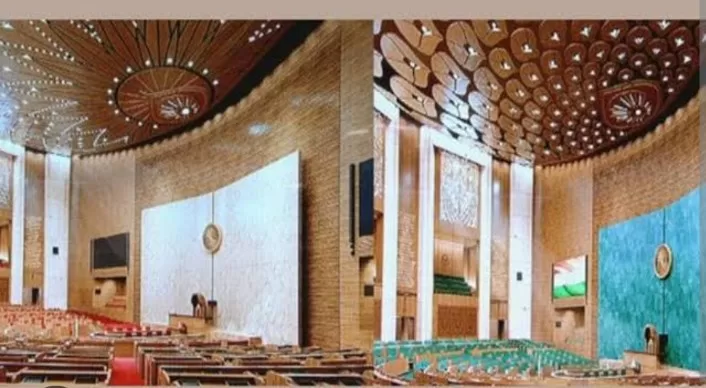New Delhi: India’s forthcoming shift to its new Parliament building heralds a host of modern features, with an “automated system” at the forefront, set to manage microphone durations for Members of Parliament (MPs) during their speeches.This system’s introduction aims to address longstanding accusations that the government has stifled opposition voices by muting their microphones, most recently exemplified during the previous session when the opposition was demanding a parliamentary inquiry into the Hindenburg report’s allegations against the Adani Group.
Mallikarjun Kharge, the Congress leader and Leader of the Opposition in the Rajya Sabha, vehemently underscored this issue, accusing the government of disrespecting parliamentary norms. In response, the ruling Bharatiya Janata Party (BJP) attributed these disruptions to a “technical fault.”
The BJP faced further criticism when a video posted by the Congress revealed the absence of functioning microphones for nearly 20 minutes. Microphone functionality was only restored upon the urging of Speaker Om Birla to maintain decorum in the chamber. Sources suggested that the BJP had decided to withhold Congress MP Rahul Gandhi’s speaking privileges until he apologized for his remarks made in London.
Prime Minister Narendra Modi opened a five-day special parliamentary session today with a 51-minute speech, addressing various topics including criticism of the opposition, acknowledgment of the G20 summit, and the Chandrayaan-3 Moon mission. During his address, PM Modi also reminisced about the old building’s “bitter-sweet memories,” including the 2001 terror attack.
Despite the potential for a turbulent first day in the new building, the bill amending the terms of appointment for the Chief Election Commissioner and Election Commissioners has been withdrawn for now. Although it had been scheduled for passage in the special session, the government has withdrawn it. Sources suggest that amendments are being contemplated to adjust the status of the CEC and panel members.
Despite this development, there are still eight bills listed for consideration in the upcoming parliamentary sessions.
Prime Minister Modi and Union Home Minister Amit Shah held discussions with senior union ministers ahead of an evening cabinet meeting. BJP Chief JP Nadda was also present during these interactions.
The new Parliament building, constructed at a cost exceeding ₹1,300 crores, introduces a range of technological advancements, including biometric security measures, a smaller “Well” area to reduce opposition protests, and a transition to a “paperless” system with MPs receiving tablet computers. The building’s six gates, named after a mix of real and mythological creatures, add a distinctive touch to this state-of-the-art parliamentary structure.
As the Parliament’s new home officially opens its doors, the hope is that these technological upgrades will enhance the legislative process and foster a more efficient and transparent parliamentary environment.




